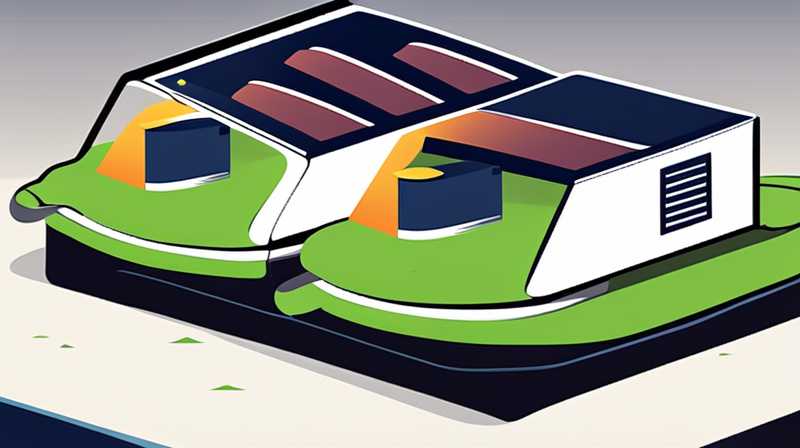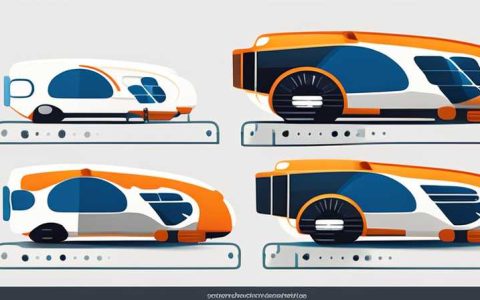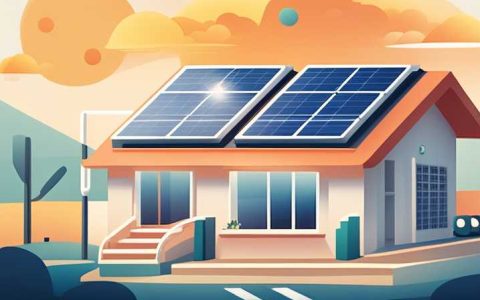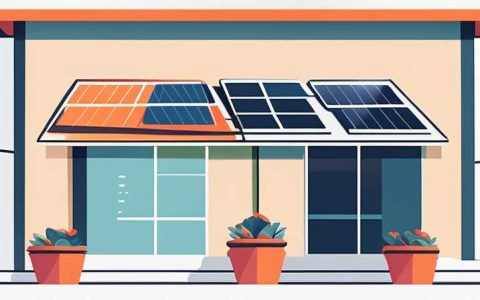
1. SOLAR PANEL TYPES
Multiple options exist when selecting solar panels for recreational vehicles, namely monocrystalline, polycrystalline, and thin-film. Each type exhibits distinct characteristics that cater to various requirements, making informed choices essential.
Monocrystalline panels are recognized for their remarkable efficiency, often reaching up to 22% in peak conditions. Their construction involves high-purity silicon cells, making them space-efficient, ideal for compact RV rooftops. Despite their higher cost, their durability and longevity, sometimes exceeding 25 years, justify the initial investment. In terms of power output, these solar panels typically generate more energy per square foot compared to other types, allowing for a smaller footprint on the RV.
Polycrystalline panels, while less efficient—averaging around 15-20%—are more affordable than their monocrystalline counterparts. Their manufacturing process entails melting multiple silicon fragments, leading to a distinctive blue hue. Although they require more space for installation due to lower energy output, their performance remains reliable. Modern polycrystalline panels have improved significantly in efficiency, presenting an attractive option for budget-conscious RV owners without sacrificing functionality.
Thin-film solar panels represent a different paradigm, offering unmatched lightweight characteristics and flexibility. While their efficiency rates hover between 10-12%, their advantage lies in being able to conform to various surfaces, which can be particularly useful for unique or unconventional RV designs. Additionally, thin-film panels often perform better in low-light environments, which is a significant determining factor for certain users. Their cost-effectiveness and versatility make them a compelling alternative for some recreational vehicle enthusiasts.
2. PERFORMANCE FACTORS
The effectiveness of solar panels for RVs does not depend solely on the panel type but also on a variety of influential performance factors. Among these are the energy requirements of the RV, location and weather conditions, and the solar panel installation.
Energy requirements are paramount. Every RV has different electrical demands based on the appliances utilized, the number of occupants, and the duration of trips. By determining these requirements, RV owners can calculate the necessary wattage output needed from solar panels. For instance, a standard RV refrigerator requires approximately 100-200 watts, while laptops and devices add extra demand. Understanding individual wattage needs is crucial for selecting the appropriate solar panel configuration.
Location and weather conditions also play a vital role in solar energy generation. Regions with abundant sunlight will maximize energy yield, while those with frequent cloud cover may require more comprehensive systems or off-grid solutions. Seasonal variations also affect sun exposure, influencing the overall energy output significantly. Combining knowledge about geographical location with an understanding of seasonal shifts grants RV owners the ability to predict energy generation accurately.
Lastly, the installation process directly impacts the overall effectiveness of solar panels. Proper orientation, tilt angles, and mounting hardware all contribute to maximizing solar absorption. For RV users who are traveling frequently, utilizing adjustable mounts may provide increased flexibility in positioning panels according to changing sunlight angles. At the same time, professional installation services may ensure that all components are geared towards maximizing energy output and are compliant with RV safety standards.
3. COST EFFECTIVENESS
Navigating the financial aspect of solar panels for RV use requires an analytical approach. This includes evaluating upfront costs, potential long-term savings, and overall return on investment.
Initially, solar panels can represent a significant investment. Monocrystalline panels, while highly efficient, often come with a price tag reflective of that efficiency. Polycrystalline and thin-film options typically present lower entry costs, which may entice financially cautious RV owners. Yet, price shouldn’t be the singular consideration; efficiency plays a critical role. High-efficiency panels deliver more energy, which can translate to savings in generator fuel and reliance on electrical hook-ups at campsites.
Another consideration is potential long-term savings. Utilizing solar panels can lead to cheaper utility bills as energy generation becomes self-sufficient, meaning RV owners are not solely dependent on campground power or gas for generators. Additionally, over time, savings from gasoline, maintenance on generators, and utility costs will accumulate. This outlines the profitability of investing in solar technology in RV spaces.
Return on investment ultimately merges upfront costs with long-term savings and less reliance on traditional energy sources. RV owners might consider calculating a payback period for installed solar panels by comparing annual savings against initial costs. This tracked data, alongside potential increases in RV resale value due to added solar capability, crafts a comprehensive understanding of financial viability associated with solar integration into RV systems.
4. ENVIRONMENTAL IMPACT
Choosing solar energy integrates more than just aspects of cost and utility; it embodies a selection in favor of sustainability and environmentally resilient energy supply. Transitioning to solar reduces reliance on fossil fuels, improving air quality over time.
The sustainability factor associated with solar energy ingestion is decidedly favorable. By installing solar panels, RV owners contribute to reducing greenhouse gas emissions, ultimately fostering a healthier planet. As increasing numbers of people transition to RV living, awareness grows surrounding the environmental footprint of each journey. This demonstrates a liveable trend aligning leisure with environmental consciousness.
In addition, solar panels create minimal environmental disruption during their operational life. Compared to traditional energy generation, solar technology produces negligible waste and no emissions. As RV enthusiasts venture into pristine locations, maintaining the ecological integrity of those settings becomes paramount. Harnessing solar energy offers an opportunity to engage in outdoor activities without exacerbating pollution or habitat disruption, thereby preserving natural beauty for future generations.
Furthermore, solar panel production is evolving towards eco-friendliness with advances in technology and recycling systems. Various manufacturers are initiating sustainable methods to ensure that both the solar modules and leftover materials minimize ecological impacts while maximizing efficiency. Adapting to these trends allows RV owners to choose panels that align with their personal values while contributing positively to environmental preservation.
5. USAGE SCENARIOS
Understanding specific usage scenarios can aid RV owners in making an informed decision when it comes to solar panel selection. Different travel styles and activities impose varying energy demands that guide panel choice, installation manner, and operational techniques.
For RV owners utilizing their vehicles primarily for weekend getaways, simpler solar setups might suffice. A small solar kit, ideally composed of 100-200 watts, often meets the energy needs for basic tasks such as charging devices and powering lights. In this arrangement, portable solar panels might be practical. Being lightweight and easily deployable, these allow individuals to benefit from instant power access while enjoying remote locations. Affordability becomes paramount in such scenarios.
Contrarily, frequent long-term travelers may require a more robust solar system to sustain a comfortable lifestyle on the road. Finding a balance between panel efficiency and capacity would be necessary, as seasonal demands fluctuate. A comprehensive setup utilizing multiple high-efficiency panels may ensure reliability while also accommodating daily energy needs efficiently. Plus, integrating a battery bank for energy storage helps manage resources, allowing for consumption on overcast days or during nighttime.
Lastly, RV users who partake in off-grid camping adventures harbor unique needs. Here, solar setup coupled with power storage solutions grows increasingly critical. Depending on the appliances used for extended stays in the wilderness, a solar array capable of generating excess energy ensures sustained power despite potential limitations in sunlight exposure. Here, a more thorough exploration of solar solutions becomes worthwhile for understanding optimal energy management on the go.
FREQUENTLY ASKED QUESTIONS
WHICH SOLAR PANEL TYPE SHOULD I CHOOSE FOR MY RV?
The choice of solar panel type significantly relies on your unique requirements and circumstances. Monocrystalline panels are ideal for those with limited available space, as they produce higher efficiency and require less surface area for installation. They also possess the longest lifespan, which can translate to a more durable investment over time. However, their higher initial costs can be a deterrent for some.
On the other hand, polycrystalline panels offer a middle ground between affordability and efficiency. Though they require more space, they continue to be a viable option for many RV users given their lower financial barrier. Lastly, thin-film panels introduce flexibility and lightweight properties, making them appropriate for diverse installations. They may not be as efficient, but they work exceptionally well in low-light settings. Identifying usage patterns and evaluating available roof space remain crucial in making this decision.
HOW DO I CALCULATE THE ENERGY NEEDS FOR MY RV?
To determine energy needs for an RV, begin by listing all the electrical items operated within the vehicle, along with their power ratings (in watts). This helps establish the total wattage needed and the duration for which each device will be used daily. For instance, an RV refrigerator requiring 200 watts operational for 8 hours translates to 1,600 watt-hours needed per day.
Next, evaluate other appliances, such as lights, laptops, or fans, and factor in their usage hours. When summed together, this cumulative watt-hour figure provides a clear picture of your total energy requirements. To accommodate for inefficiencies, it’s prudent to add 20% more to the total figure to account for energy losses in the system. The resulting number represents daily watt-hour needs that guide decisions about solar panel size and configuration; ensuring adequate energy generation for comfortable RV living.
CAN I INSTALL SOLAR PANELS MYSELF ON AN RV?
Yes, installing solar panels on an RV can be a viable DIY project, provided one has the right tools and knowledge. Numerous resources, including online tutorials and guides, provide a step-by-step framework to assist in the process. Planning is essential, as it involves careful considerations regarding placement on the roof, wiring, and securing the panel mounts adequately to withstand wind and vibrations during travel.
However, prior forays into electrical work might benefit from consulting or employing skilled professionals if uncertainty arises. Incorrect installation could lead to wiring or safety issues that may compromise the vehicle’s integrity and pose risks while on the road. Thus, aspiring DIYers must assess their comfort level with electrical systems and make thoughtful choices on whether to tackle the project independently or enlist help.
Boldly integrating solar energy into RV setups enriches the experience of travelers. Astute selection of solar panels, an informed understanding of both performance factors and financial considerations, all weave a narrative of sustainability, efficiency, and personal empowerment within this unique lifestyle. Solar energy transforms RV living, allowing devotion to exploration while caring for the planet. By embracing advanced energy solutions and eco-friendly practices, RV enthusiasts not only enhance their journeys but contribute positively to a sustainable future.
Original article by NenPower, If reposted, please credit the source: https://nenpower.com/blog/which-solar-panel-is-better-for-rv-2/











